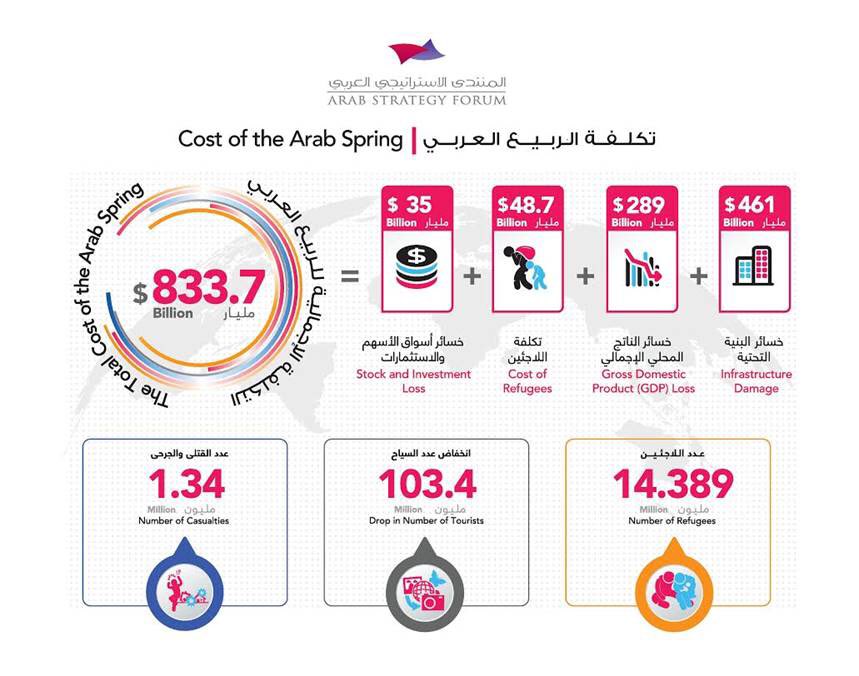Documenting the Arab Spring Fallout
| Tunisia's uprising in January 2011 drove support for protests in surrounding countries Getty Images |
The "Arab Spring Cost Report" was released in Dubai by the Arab Strategy Forum. The study documenting the economic fallout of the 'Arab Spring' gives a figure of $883.7 billion lost as a result of the uncertainty and turmoil five years ago that took place in Tunisia, Egypt, Libya, Bahrain and Syria, those world-class social upheavals that the international community took signalling a modernization of the Arab world and a re-structuring of their political systems.
What infamously resulted was the breakdown of law and order that had been held together by ruthless dictators, and the dismal fate of an estimated 1.34 million people killed or injured, not to mention the millions more who were left homeless in the upheavals throughout the Maghreb and the Middle East. The financial loss relates to foregone international investments as well as the massive losses in securities markets, GDP failures and infrastructure reconstruction invoices.

Although Syria is included in this name-place gathering of social-political failure, they must stand as a special case. Tunisia has rebounded and its political factions have reunited in the greater interests of preserving their heritage, culture and a balanced political awareness. Libya is now finally, after violent paroxysms of tribal and sectarian conflicts, finding some measure of accommodation to preserve itself, as well.
Egypt has rebounded from an Islamist theocracy failing to govern the country for the good of the country, back to the military rule that has sustained it for decades upon decades. Egypt had little option, it seems, but to return to the tried-and-true, having removed its benevolent tyrant in favour of a military autocracy; little option given the violence that is inflicted upon it by the convergence of Islamist factions coordinating themselves to overwhelm Egypt into a Sharia state.
Syria is its own very special case, where the cruel violence of Baathist Alawite Hafez al-Assad has been overwhelmingly superseded by his son-and-heir Bashar who learned the lessons of brutality well from his father. Syria's nascent Arab Spring never really got off the ground, it was simply unable to assert itself when the regime took steps to grind it into the ground through arrests of young and old, torture and extrajudicial slaughters.
The entire Middle East might have been looking wistfully to the United States for some signal usually forthcoming that the world's single power authority would intervene on the part of liberty and democracy. When the green movement in Iran staged their demonstrations against the ruling mullahs they were mown down, arrested and waited in vain for America to assert its stern commitment to peace and good governance.
But it had been to the ayatollahs that President Obama had extended the hand of friendship, not rebellious Iranians. And nor did Barack Obama recall that Hosni Mubarak had a special relationship with the United States; that relationship earned him a disinterested, flippant back of the hand dismissal, while the Muslim Brotherhood gained respected entry to the White House and Mohammed Morsi was lauded as an answer to Egypt's need.
The U.S. was firm that Syria's problems began and ended with Bashar al Assad and no question; before the tempest could be quelled he had to go. He is no longer going. Secretary of State John Kerry, speaking on behalf of the Obama administration, feels now he should remain. In the interests of stability, and an end to the civil conflict, he should now stay as a stabilizing force; a fixation emanating from Moscow and now endorsed by Washington.
Effectively, the United States has thrown its regional interests -- leading from behind -- backing the Islamic Republic of Iran, Hezbollah, and the Baathist regime in Syria, a trifecta of Shiite terrorism equally brutal and dedicated to assigning death duties to Sunni opponents as the Islamic State of Iraq and the Levant is to liquidating as many Shiites as they possibly can.
The Syrian Sunni population, a majority of Syrians, has been viciously crushed, the rebel leadership that had looked appealingly to the United States for basic support and a fraction of the arms that had been given to Iraq were left to their own devices, not quite a match for the military offence of the Shiite regime. It has taken almost five years, but 182,079 Syrians have been slaughtered courtesy of their president and his colleagues from Lebanon, Iran and Russia.
The number of Syrian civilians on the other hand, killed by the Islamic State butchers dwindles in comparison.
Labels: Arab Spring, Conflict, Hezbollah, Iran, Middle East, North Africa, Russia, Syria
0 Comments:
Post a Comment
<< Home